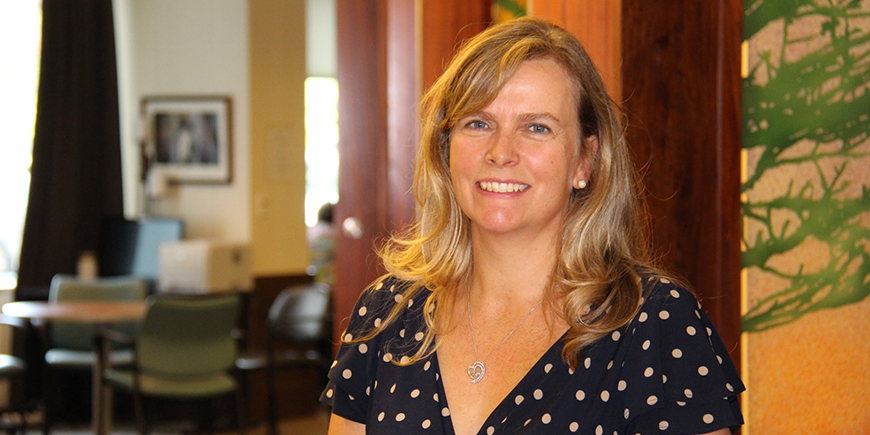Accelerating seniors’ access to specialists
November 19, 2018

“The eConsult model is going to be able to improve seniors health care by getting more rapid advice from specialists… I think we’re only at the beginning of what we can do in long-term care.”
“I had images in my mind, particularly from wintertime, of people coming out of the ambulance huddled under multiple blankets,” remembers Dr. Clare Liddy.
This was a familiar scene to Dr. Liddy, a family doctor with The Ottawa Hospital Academic Family Health Team. Seniors being transported from long-term care (LTC) homes to specialist appointments at her hospital, and back again. Patients whose caregivers often took entire days off work to help them attend appointments.
“I have a patient in Cornwall who was referred to a doctor in Ottawa and his son had to drive him back and forth (an hour’s drive each way). The appointment is sometimes a quick in-and-out visit; in the end, it’s very disruptive,” says Dr. Liddy.
Over coffee one day, she discussed the issue with her colleague Dr. Erin Keely, an endocrinologist who had seen similar issues on the other side of the referral-consultation process. Together, they started looking for a better way of treating these patients, with less disruption.
Drs. Liddy and Keely decided to implement eConsult, a web-based service they developed back in 2009 for use in medical practices. The online tool allows doctors and nurse practitioners to send questions and health information securely to a designated pool of specialists.
“It’s really a conversation, creating the ability to have a conversation, and that’s going to translate into better care for people."
“Let’s say a blood test comes back and there’s something that might be a bit out of sorts. You would normally send the patient to see a hematologist,” says Dr. Liddy. “Instead, with eConsult, you can send the lab result with your question, a little bit of a patient history, and ask whether there needs to be any follow-up, and what would your advice be?”
Similarly, the family doctor can ask a clinical pharmacist how to manage or taper a patient’s medications following surgery or send a photo of a pressure ulcer to a dermatologist for suggestions on how to treat it. The hope is that with guidance, the family doctor will be able to manage the patient alone, and if a visit to a specialist is still needed, that it will be enhanced by the information exchanged.
“It’s really a conversation, creating the ability to have a conversation, and that’s going to translate into better care for people,” says Dr. Liddy.
After being introduced nearly a decade ago, eConsult is now being used in doctors’ offices across Canada. In Ontario, over 100 specialty services are available through eConsult with more than 500 active specialists who respond on average within two days. Consistently across all jurisdictions, the service is proven to reduce the need for additional specialist visits. In early pilot tests, Drs. Liddy and Keely found that two-thirds of patients who had an eConsult didn’t need a referral based on the advice they received.
But until now, eConsult has never been used in LTC homes.
Through their initiative and Dr. Liddy’s work with the Bruyère Research Institute, the program is now being piloted in six LTC homes in the Champlain Local Health Integration Network (LHIN) in Eastern Ontario.
Dr. Liddy is optimistic similar results can be achieved but admits integrating eConsult into LTC environments is more difficult. Many homes are small, with limited resources and staff. For these reasons, Dr. Liddy says each facility may need a tailored approach.
At St. Patrick’s Home of Ottawa, eConsult is being incorporated into the existing workflow. Clerical staff who already book face-to-face appointments for seniors with a specialist have now been trained to input the physician’s referral on the computer.
“We just need to make sure the process of implementation is going well and that we are not burdening what is already a burdened system,” says Dr. Liddy.
That’s also why the eConsult team is doing focus groups at each of the six homes piloting the technology. They want to know how eConsult is adding value and what issues need to be addressed. In 2019, the team plans to test the program at an additional 18 LTC homes in Ontario — in cities like London, Hamilton and Kingston.
“The eConsult model is going to be able to improve seniors health care by getting more rapid advice from specialists. I see huge potential for reducing the number of follow-up appointments. I think we’re only at the beginning of what we can do in long-term care,” says Dr. Liddy.
The opinions stated by Physician Changemakers are made in a personal capacity and do not reflect those of the Canadian Medical Association and its subsidiaries.
